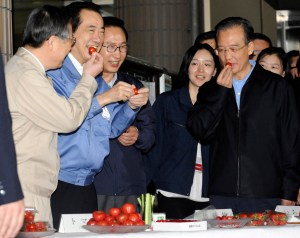
Chinese Premier Wen Jiabao, South Korean President Lee Myung-Bak, and Prime Minister Naoto Kan eat tomatoes from Fukushima prefecture on May 21, 2011 (AFP)
On Saturday, the leaders of the world’s second, third and 15th largest economies got together in Fukushima City and ate veggies to demonstrate how safe it is to do just that. I think it’s always a little embarrassing to observe politicians in orchestrated eating and/or drinking events (see Obama’s three-guys-just-having-a-beer moment at the White House with the Cambridge, Mass. police chief and Henry Louis Gates Jr. — cringe). Watching Chinese Premier Wen Jiabao primly tuck into a non-irradiated cucumber spear didn’t improve my feeling about this kind of theater.
Nevertheless, eating tomatoes and cukes for the cameras is more helpful than shunning them. Wen and South Korean President Lee Myung-Bak went to Japan’s disaster-struck region over the weekend to express their sympathy to residents and to kick off a new period of cooperation in a region beset with both long-playing historical grievances and recent geopolitical squabbling, including a lift on the import ban of some Japanese farm products.
Despite the complicated feelings that China and South Korea have harbored about the archipelago since their respective occupations by Japan, both nations were the among the first to send rescue teams after the 9.0 quake and ensuing tsunami destroyed much of Japan’s northeast coast on March 11. It was a spasm of solidarity that diminished as the severity of the nuclear crisis at Fukushima became clear. As reports of radiation contamination in crops grown near the crippled nuclear power plant surfaced, China and South Korea, and many other nations, slapped import bans on several Japanese f0od exports, contributing to a global fear of Japanese products that has sent the nation’s fishing and farming sectors into a tailspin.
Over the weekend, Wen pledged he would partially raise the ban on Japanese agricultural products, providing Tokyo ensured they did not contain any nuclear contamination. It was more symbolic, however, than practical: the Chinese premier only agreed to start taking agricultural goods from two of 12 prefectures from which Beijing has banned products since the nuclear disaster. In other words, bans on products from ten prefectures are still intact. He can apparently afford to be choosy: days after the quake, Beijing announced that the EU had overtaken Japan as China’s largest import trading partner.
It will be interesting to see how far the Great Tohoku Earthquake, as it’s known in Japan, will take relations between the three countries. This isn’t the first time the leaders have met. This generation of trilateral summits kicked off in 2008, and there have been three meetings before. As the mood between Tokyo and Washington has gotten chilly in recent years, and as China has increased its military presence throughout the region, Washington has watched with some concern to see whether Economies #2 and #3 (both before and after they swapped spots in that ranking last year) would try to put their ghosts aside and work together.
Before March 11, it was looking like the answer was no. Until recently, Japan and China were embroiled in a standoff over eight uninhabited islands and rocks (the Senkaku or Diaoyu Islands, depending on whether you’re in Japan or China). Tensions came to a head last fall when Japan arrested a Chinese fishing captain whose boat they said had wandered provocatively close to the disputed territories.
Now, however, it appears Japan’s PM Naoto Kan is angling for this moment of healing to smooth over more than a few import restrictions. By Sunday night, the leaders issued a declaration that, in addition to the easing on imports, outlined new programs in nuclear cooperation, including improving coordination between the nations’ nuclear experts; programs for renewable energy and conservation; and improving cross-border disaster preparedness. The neighbors’ also pledged to fast track a trilateral free-trade agreement that has been in the works, reducing taxes and stimulating investment and trade in the region, among other things.
Notably, the three nations’ business leaders, circling on the sidelines of the summit, also agreed as part of the still-theoretical FTA to “promote standardization of energy-saving technologies,” according to the Mainichi Daily News. If China, Japan and South Korea had trade incentives to get together on renewables, that global market might get started in earnest — and in turn provide some kind of solution for the gaping hole in Japan’s energy policy since Kan announced nuclear expansion was off the table. That would be the beginning of something that the U.S. should be concerned about.

